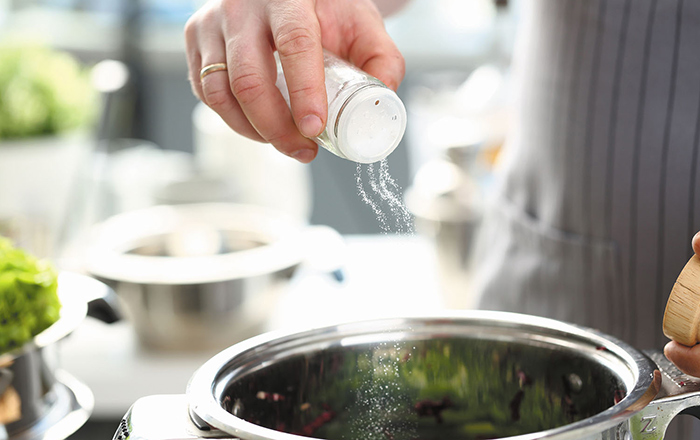Both bouillon cubes and seasoning powder are types of seasonings used in cooking, so which one is better for health?
What is MSG?
Monosodium glutamate (MSG) is a form of glutamic acid, an amino acid found in various natural foods. Chemically, the powder is a crystalline substance, similar to table salt or sugar. It combines sodium and glutamic acid.
Glutamic acid performs many functions in the body, such as contributing to protein formation. Glutamic acid is a precursor to the neurotransmitter gamma-aminobutyric acid (GABA). GABA is plentiful in the nervous system and plays a significant role in inhibition or calming signals.
Glutamic acid is naturally present in our bodies and found in many types of food. Nowadays, MSG is produced through the fermentation process of starch, sugar beets, sugarcane…
When a protein containing glutamic acid breaks down, for instance, through fermentation, it becomes glutamate. Glutamate activates taste receptors, creating the savory, sweet taste known as umami.
MSG, or seasoning powder, is the most commonly used food additive in both industrial food processing and home-cooked meals.
Most of the foods we consume daily contain glutamate, such as meat, fish, eggs, milk, seafood, vegetables, and fruits. Therefore, we absorb this compound through our diet. Glutamate naturally enhances the savory and delicious taste of food.
According to Associate Professor Nguyen Thi Lam, former Deputy Director of the National Institute of Nutrition, since the main component of MSG is glutamate, a common amino acid that helps build protein in living organisms, MSG contains umami or the meaty taste, which enhances the flavor of food and makes it more appetizing.
Now, what about bouillon cubes?
Bouillon cubes contain various ingredients, and among these, the essential elements are seasoning powder (flavor enhancer 621), along with flavor enhancers 627 and 631 (also known as super-flavor enhancers, which are 10-15 times sweeter than regular seasoning powder).
The primary source of taste in bouillon cubes comes mainly from these flavor enhancers rather than from “bone broth and meat,” as commonly advertised (if any, it’s meat powder rather than concentrated broth made from bone and meat, as this would quickly spoil and be hard to preserve at room temperature).
All three flavor enhancers, 621, 627, and 631, fall into the category of permitted food additives, but excessive consumption may not be beneficial for health, potentially causing unpredictable side effects.

Should we use bouillon cubes or seasoning powder?
Both bouillon cubes and seasoning powder are not necessary in daily nutrition.
Neither bouillon cubes nor seasoning powder is inherently better. Bouillon cubes themselves contain seasoning powder (MSG) and the super-flavor enhancers.
It’s best for consumers to limit both types of seasonings. However, if you still use them, consider the following:
Compared to bouillon cubes, seasoning powder appears to be “more natural” when considering ingredient composition. Bouillon cubes, with their “more complex” ingredients, make it more challenging for consumers to understand and control the safety of the product.
When using bouillon cubes, besides imparting a sweet taste to cooked dishes, they also add a salty flavor. Overuse of bouillon cubes might cause consumers to neglect adding extra salt to their meals, potentially leading to iodine deficiency over time.
The choice between using bouillon cubes or seasoning powder depends on personal habits and preferences. Regardless of the chosen type, consumers should select products with clear brand labels and origins. Avoid purchasing unlabeled or unknown origin products, as these uncontrolled quality products may contain harmful substances.
When using seasoning powder, note that normal cooking temperatures do not cause MSG to transform into harmful compounds. However, if using seasoning powder to marinate food for grilling, it’s recommended to grill at temperatures below 250°C. At higher temperatures, MSG might transform into harmful substances for the body.












